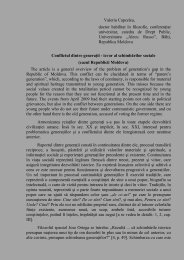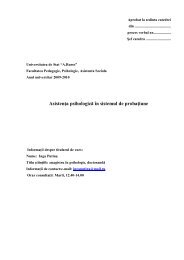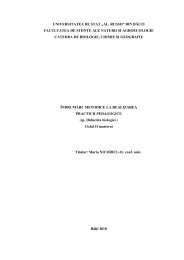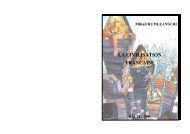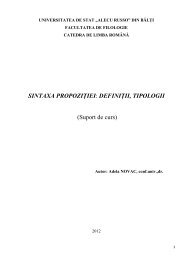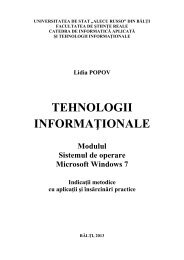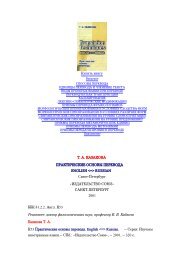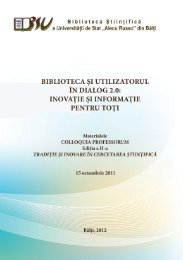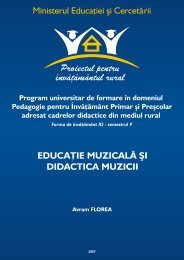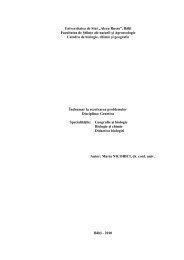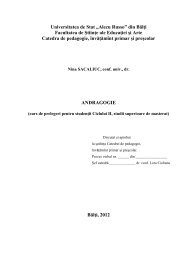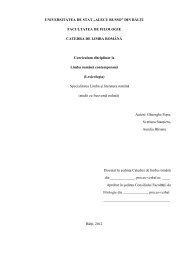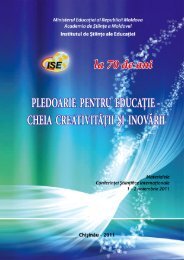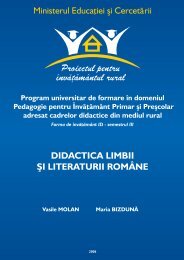Departamentul de CercetÄri Socio-Umane al Institutului de Istorie âG
Departamentul de CercetÄri Socio-Umane al Institutului de Istorie âG
Departamentul de CercetÄri Socio-Umane al Institutului de Istorie âG
You also want an ePaper? Increase the reach of your titles
YUMPU automatically turns print PDFs into web optimized ePapers that Google loves.
222 Cristina Fleşeriu, Adam Fleşeriu 10<br />
În urma unui secol <strong>de</strong> evoluţie, putem sintetiza curentele <strong>de</strong><br />
gândire care domină teoria marketingului mo<strong>de</strong>rn. Dezbaterile cu<br />
privire la cercetările şi caracterul marketingului permit să relevăm faptul<br />
că în evoluţia marketingului se pot distinge trei şcoli <strong>de</strong> gândire 28 :<br />
• empirismul logic 29 , care susţine că toate construcţiile teoretice<br />
trebuie testate empiric, acordând prioritate cercetărilor cantitative. Pe<br />
baza cercetărilor la nivel micro, se pot elabora teorii interesante, dar,<br />
eludând latura c<strong>al</strong>itativă, nu se pot trage <strong>de</strong>cât concluzii parţi<strong>al</strong>e.<br />
• relativist-construcţionistă 30 , şco<strong>al</strong>ă <strong>de</strong> gândire care provine<br />
din istoria sau sociologia ştiinţei. Ea <strong>de</strong>nunţă abuzul meto<strong>de</strong>lor<br />
cantitative şi promovează meto<strong>de</strong>le c<strong>al</strong>itative, ceea ce contribuie la<br />
diversificarea meto<strong>de</strong>lor <strong>de</strong> cercetare; ea consi<strong>de</strong>ră că în formularea<br />
tezelor un rol important revine <strong>de</strong>ducţiei şi evi<strong>de</strong>nţei.<br />
• teoria <strong>de</strong> sinteză, bazată pe aşa-numitul curent <strong>al</strong> „f<strong>al</strong>sificării”,<br />
care re<strong>al</strong>izează o îmbinare a celor două curente prezentate, relevând că<br />
„marketingul posedă toate caracteristicile unei ştiinţe” 31 .<br />
Reţinând <strong>de</strong> la prima şco<strong>al</strong>ă importanţa <strong>de</strong>ciziilor metodologice<br />
şi <strong>de</strong> la cea <strong>de</strong>-a doua rolul particular <strong>al</strong> contextului în cadrul<br />
cercetării, şco<strong>al</strong>a <strong>de</strong> sinteză evi<strong>de</strong>nţiază locul şi rolul marketingului ca<br />
ştiinţă. La început <strong>de</strong> mileniu trei, se poate susţine că marketingul este<br />
<strong>de</strong>ja o ştiinţă economică care are un domeniu propriu <strong>de</strong> cercetare, ce<br />
constituie un segment <strong>al</strong> vieţii economice.<br />
Apariţia ştiinţei marketingului este rezultatul diviziunii soci<strong>al</strong>e a<br />
muncii, care are loc şi în domeniul ştiinţei economice. În secolul <strong>al</strong> XXlea,<br />
marketingul se <strong>de</strong>sprin<strong>de</strong> din economia politică, îşi <strong>de</strong>limitează<br />
propriul domeniu <strong>de</strong> cercetare, îşi conturează o metodologie a<strong>de</strong>cvată,<br />
28 P. L. DUBOIS, A. JOLIBERT, op .cit., p. 4–7.<br />
29 S. D. HUNT, Marketing Theory: The Phylosophy Of Marketing<br />
Science, Irwin, Homeword, Illinois, 1983; P. F. ANDERSON, Marketing<br />
Scientific Progress and Scientific Method, „Journ<strong>al</strong> of Marketing”, 42, 4,<br />
1983, p. 18–31.<br />
30 J. P. PETER, J. C. OLSON, Is Science Marketing, „Journ<strong>al</strong> of<br />
Marketing”, 47, 4, 1983, p. 111–135.<br />
31 S. M. LEONG, Metatheory and Metamethodology in Marketing : A<br />
Lakatotian Reconstruction, „Journ<strong>al</strong> of Marketing”, 49, 4, 1985, p. 23-40.



